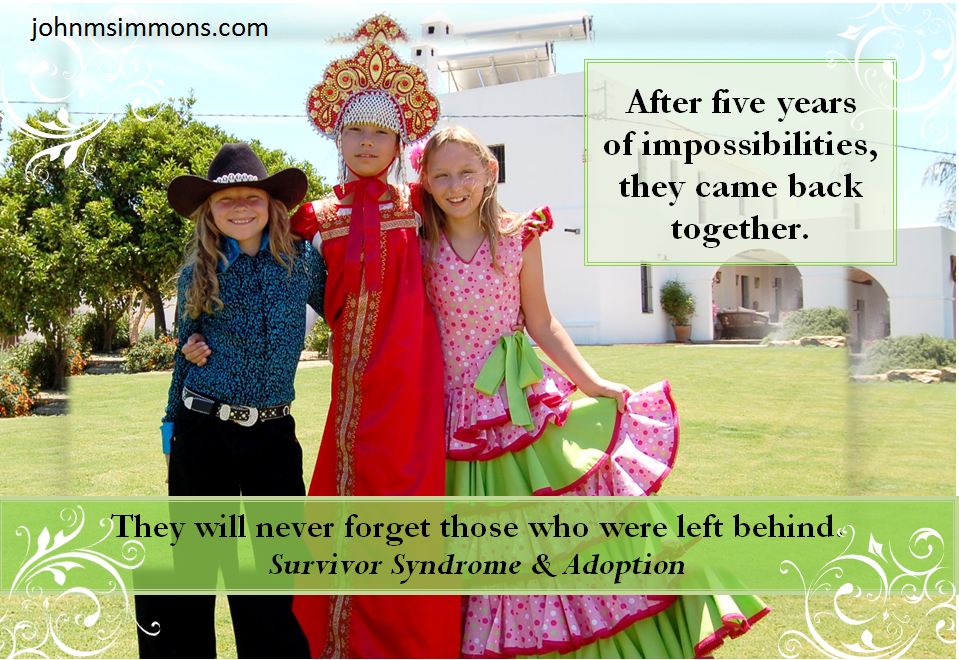Survivor Syndrome and Children Adopted From Orphanages
Survivor Syndrome has been rough on my daughter. Sarah had been home from Russia for five years when we met with her friends, in Spain. Those three girls were part of the small percentage of children who regained families after becoming old enough to be moved from “Baby Hospitals” to the Partizansk Children’s Home. One found new Russian parents. Another joined a wonderful Spanish family, while Sarah donned a cowboy hat and became a Yankee.
It had taken five years of impossibilities, around obstacles set by Russian laws that seal adoptions, to locate and gather the three best friends for a reunion. Marina, from Russia, attended with an adult sister because their parents were helping other family members in crisis. Part of the way through our week together in a Spanish villa, Marina and Yana presented Sarah with a gift from their mother. Sarah squealed as she opened the wrapping paper to reveal a Hello Kitty photo album.
Marina and her mother had returned to the orphanage where the three friends “sisters of circumstance,” had lived together for a little more than a year. They took pictures of the large, brick building that housed over 100 children without families. They photographed the dormitory where the three little girls had sat in their beds and prayed for their own homes and families, while peers mocked. Then the mother and daughter took pictures of the other children who shared that dormitory at the time my daughter was there. No one knew that such a thoughtful gift would be a lifetime trigger in Sarah’s battle with Survivor Syndrome.
Sarah couldn’t believe it. I guess that’s where Survivor Syndrome starts.
Sarah was somber as she viewed the photographs of the ones left behind, without homes. Marina was surprised when my daughter didn’t recognize the faces. “Yes, that is Dasha,” she countered when Sarah questioned. “But it doesn’t look like Dasha,” Sarah replied. “It is Dasha.”
That’s pretty much how the conversation went as Marina pointed out Maksím, Ksenya, and the others. Sarah couldn’t believe that her friends were still there, destined for lives on the streets in only a few more years. I never expected anything different, but that didn’t make it easier. Sarah couldn’t believe it. I guess that’s where Survivor Syndrome starts. I couldn’t bear it.
Several weeks after we returned from Spain, Sarah broke down. “Why is Dasha still in the orphanage?” she cried. “Why are all of my friends still there?” My wife asked her where she thought they would be. That only upset her more. Throwing logic at someone who suffers from Survival Syndrome doesn’t take away guilt. In fact, logic probably makes things worse. “I don’t know,” Sarah said in frustration. “Not there. Not… there.”
If Sarah didn’t think they would be there it could have only been because she didn’t think (at least about them). I guess that’s a survival skill for those who suffer from Survivor Syndrome. How could you think about those who didn’t “survive?” From time to time, reality sets in. It can be triggered by a news piece, a similar face, a sound, a smell, even a motion. The effects of Survivor Syndrome come rushing back. They didn’t survive. I did. Why?
The torment of Survivor Syndrome continues. I’m not more worthy than my friends were. They should have survived too! It shouldn’t have been me. I don’t deserve what I have. I shouldn’t have my own family because they don’t. If they didn’t get homes, then I shouldn’t have, either.
Survivor Syndrome is one of the reasons why I call adoption a journey rather than an event.
Therapy helps Sarah with Survivor Syndrome. As a family, we try to be supportive. We allow her the feelings that she must have, even as we try to help her to curb self-destructive actions and habits that grow so noxiously well in the fertile soil of Survivor Syndrome.
Survivor Syndrome is one of the reasons why I call adoption a journey rather than an event. The torments that come with her condition aren’t easy for my daughter. There are so many things from her history that are difficult for her to process and to cope with. I wish it was easier. Dare I say it? I wish that my daughters never had to experience the traumatic things that brought them into our home; to join our family. I wish that they had been able to live life in a successful and protective family from the beginning. On the other hand, I am so, so glad they are here. Adoptions and feelings associated with it are often paradoxical, much as I wish they weren’t.
I guess I should stop wishing and live in the present, rather than fantasy. Perhaps I should hope instead of wish.
So today I hope that there can be more and more children from shattered families, who gain new ones. I hope that they find their own homes. I hope that they struggle through Survivor Syndrome, rather than failing to survive.
Your comments matter. Please scroll down and share your thoughts!
Read more articles by John M. Simmons about Adoption
Return to John M. Simmons’ blog
Ensure you don’t miss anything by signing up for Our Weekly Newsletter. This is all you need to be qualified for occasional giveaways like the Kindle Fire that Kristy Goulart won in July!

